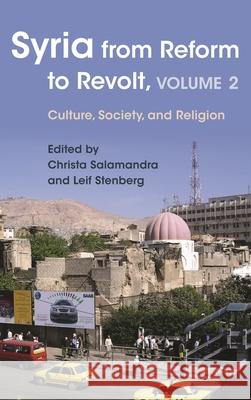Syria from Reform to Revolt: Volume 2: Culture, Society, and Religion » książka
Syria from Reform to Revolt: Volume 2: Culture, Society, and Religion
ISBN-13: 9780815634256 / Angielski / Twarda / 2015 / 256 str.
Syria from Reform to Revolt: Volume 2: Culture, Society, and Religion
ISBN-13: 9780815634256 / Angielski / Twarda / 2015 / 256 str.
(netto: 233,23 VAT: 5%)
Najniższa cena z 30 dni: 241,90
ok. 30 dni roboczych.
Darmowa dostawa!
As Syria's anti-authoritarian uprising and subsequent civil war have left the country in ruins, the need for understanding the nation's complex political and cultural realities remains urgent. The second of a two-volume series, Syria from Reform to Revolt: Culture, Society, and Religion draws together closely observed, critical and historicized analyses, giving vital insights into Syrian society today. With a broad range of disciplinary perspectives, contributors reveal how Bashar al-Asad's pivotal first decade of rule engendered changes in power relations and public discourse-dynamics that would feed the 2011 protest movement and civil war. Essays focus on key arenas of Syrian social life, including television drama, political fiction, Islamic foundations, and Christian choirs and charities, demonstrating the ways in which Syrians worked with and through the state in attempts to reform, undermine, or sidestep the regime. The contributors explore the paradoxical cultural politics of hope, anticipation, and betrayal that have animated life in Syria under Asad, revealing the fractures that obstruct peaceful transformation. Syria from Reform to Revolt provides a powerful assessment of the conditions that turned Syria's hopeful Arab spring revolution into a catastrophic civil war that has cost over 200,000 lives and generated the worst humanitarian crisis of the twenty-first century.
As Syrias anti-authoritarian uprising and subsequent civil war have left the country in ruins, the need for understanding the nations complex political and cultural realities remains urgent. The second of a two-volume series, Syria from Reform to Revolt: Culture, Society, and Religion draws together closely observed, critical and historicized analyses, giving vital insights into Syrian society today.With a broad range of disciplinary perspectives, contributors reveal how Bashar al-Asads pivotal first decade of rule engendered changes in power relations and public discourse-dynamics that would feed the 2011 protest movement and civil war. Essays focus on key arenas of Syrian social life, including television drama, political fiction, Islamic foundations, and Christian choirs and charities, demonstrating the ways in which Syrians worked with and through the state in attempts to reform, undermine, or sidestep the regime. The contributors explore the paradoxical cultural politics of hope, anticipation, and betrayal that have animated life in Syria under Asad, revealing the fractures that obstruct peaceful transformation. Syria from Reform to Revolt provides a powerful assessment of the conditions that turned Syrias hopeful Arab spring revolution into a catastrophic civil war that has cost over 200,000 lives and generated the worst humanitarian crisis of the twenty-first century.











